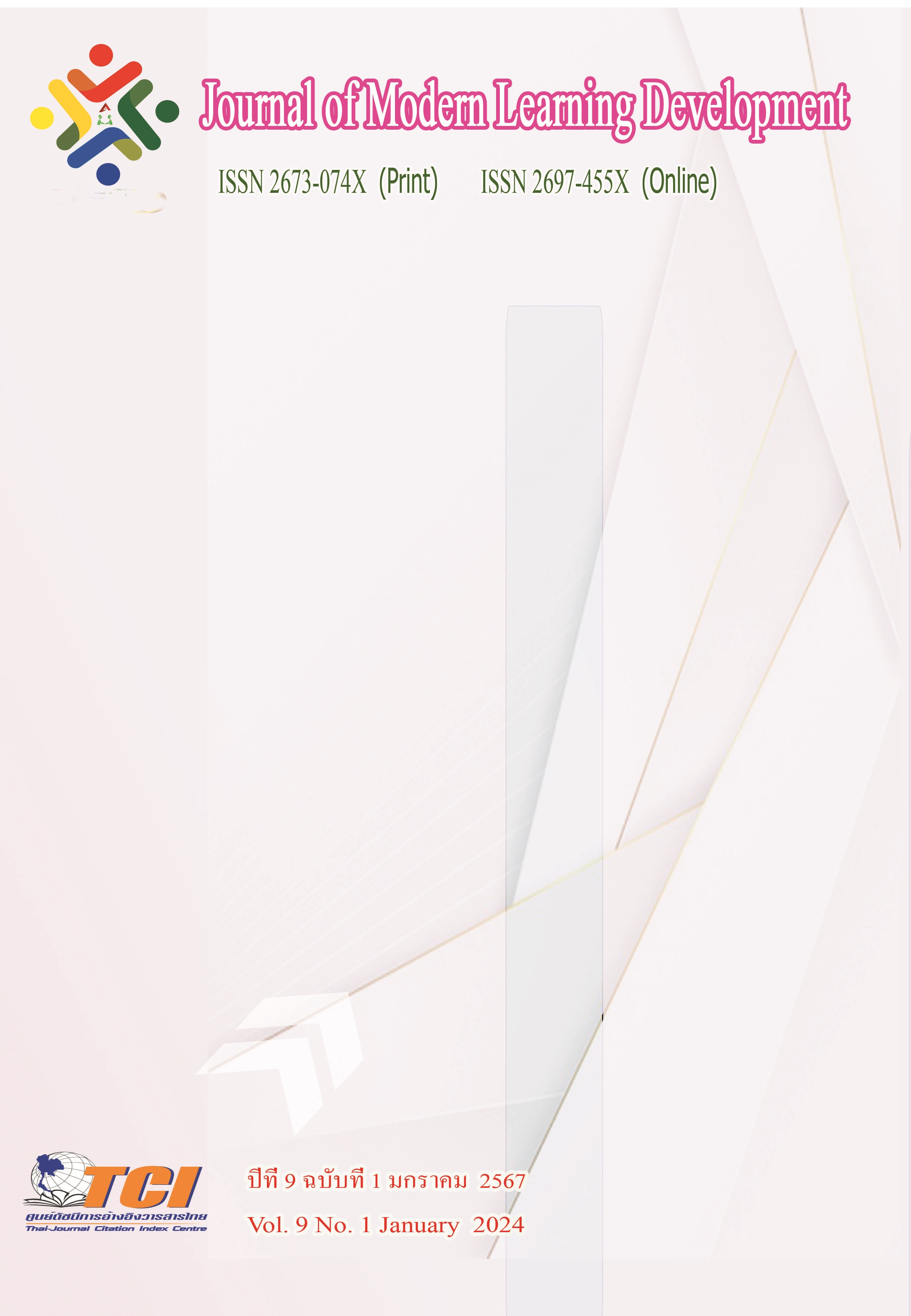The influence of causal factors on Organizational Performance in Private Sector Organizations
Main Article Content
Abstract
The objectives of this research were to: 1) test the direct influence of causal factors on organizational performance in the private sector; and 2) test the indirect influence of causal factors on organizational performance in the private sector through human resource management strategies. In this study, a quantitative method was used. The data were collected from 300 entrepreneurs in the energy industry through purposive sampling and simple random sampling. The research tool was a questionnaire with an IOC value of 0.95. The obtained data were analyzed and processed using the least squares path structure equation through the Smart PLS program.
The results of the research, according to the objectives 1) Test the direct influence of causal factors on organizational performance in the private sector. The causal factors influencing organizational performance in the private sector, namely leadership style, employees' commitment, and human resource management strategies, had a direct positive influence on organizational performance in the private sector. There was a positive direct influence on the human resource management strategies; 2) test the indirect influence of causal factors on the organizational performance in the private sector through human resource management strategies. It was found that the leadership style and employees' commitment had an indirect positive influence on organizational performance in the private sector through human resource management strategies.
The organizations in the private sector can use the knowledge and findings from this research to apply in planning and determine strategies for improving, developing, promoting, and extending organizational performance to continually improve. It is beneficial for further business competition.
Article Details
References
Allen, N. J., & Meyer, J. P. (1990). The measurement and antecedents of affective, continuance and normative commitment to the organization. Journal of Occupational Psychology, 63 (1), 1-18.
Andrew, A. (2017). Employees’ Commitment and Its Impact on Organizational Performance. Asian Journal of Economics, Business and Accounting, 5 (2), 1-13.
Aktar, S. (2012). The Impact of rewards on employee performance in commercial banks of Bangladesh: An empirical study. IOSR Journal of Business and Management, 6 (2), 9–15.
Arif, S. and Akram, A. (2018). Transformational Leadership and Organizational Performance. Seisense Journal of Management, 1 (3), 59-67.
Bejinariu, A.C., Jitarel, A., Sarca, I., & Mocan, A. (2017). Organizational change management-concepts definitions and approaches inventory. In Management Challenges in a Network Economy: Proceedings of the Make Learn and TIIM International Conference, 321-330.
Biljana, D., Maja, I.D., Vinko, L. and Sandra, M. (2020). The impact of employees' commitment on organizational performances. Strategic Management, 25 (3), 028-037.
Campbell, J. P. (1977). On the nature of organizational effectiveness. In P. S. Goodman, J. M. Pennings & Associates (Eds.), New perspectives on organizational effectiveness, 13–55.
Decker, P., Durand, R., Mayfield, C. O., McCormack, C., Skinner, D., & Perdue, G. (2012). Predicting implementation failure in organization change. Journal of Organizational Culture, Communication and Conflict, 16 (2), 29–49.
Dina, L. and Alina, L. (2020). The Impact of Transformational Leadership on Organizational Effectiveness. online. From link: https://www.researchgate.net/profile/Dina-Lut/ publication/341267219.pdf
Deeprose, D. (1994). How to Recognize and Reward Employees. AMACOM, New York.
Ehijiele, E. (2019). The Influence of Employees’ Commitment on Organizational Performance in Nigeria. online. From link:https://www.researchgate.net/publication/334560138
Energy Policy and Planning Office (EPPO). (2022). ANNUAL REPORT 2022. online. From link:https://www.eppo.go.th/images/Infromation_service/EppoAnnualReport/EppoAnnualReport2022.pdf
Greenleaf, R. K. (1970). The servant as leader. Robert K. Greenleaf Publishing Center. Journal of Leadership, 2 (4), 00.
Herlina et al. (2022). Strategic Human Resources Management Practices and Employee Commitment: Literature Review. Budapest International Research and Critics Institute-Journal, 5 (2), 14454-14461.
Huang, L.S. (2006). Transformational leadership has effect on organizational performance: the organizational culture as an intermediary variable. Unpublished master's thesis, National Taipei University, Taipei, Taiwan.
Hughes, M. (2011). Do 70 per cent of all organizational change initiatives really fail. Journal of Change Management, 11 (4), 451–464.
Lopez-Cabrales, A., Bornay-Barrachina, M. and Diaz-Fernandez, M. (2017). Leadership and Dynamic Capabilities: The Role of HR Systems. Personnel Review, 46 (2), 255–276.
Irefin, P. and Mechanic, M. A. (2014). Effect of Employee Commitment on Organizational Performance in Coca Cola Nigeria Limited Maiduguri, Borno State. IOSR Journal of Humanities and Social Science (IOSR-JHSS), 19 (3), 33-41.
Karl, K. W., and Lewis, P. (1987). Transactional and transformational leadership: A constructive/developmental analysis. The Academy of Management Review, 12 (4), 648–657.
Markos, S., & Sridevi, M. S. (2010) Employee engagement: The key to improving performance. International Journal of Business and Management, 5, 89–96.
Meyer, J. P., & Allen, N. J. (1997). Commitment in the Workplace: Theory, Research and
Application. Thousand Oaks, California: Sage.
Onyango, T. O. (2012). The influence of training and development on employees performance at Mudete tea factory. International Journal of Scientific Research and Management, 6 (3), 191–198.
Princy, K. and Rebeka, E. (2019). Employee Commitment on Organizational Performance. International Journal of Recent Technology and Engineering, 8 (3), 891-894.
Sanyal, S., & Hisam, M. W. (2018). Impact of training and development on the performance of employees-A comparative study on select banks in sultanate of Oman. International Journal of Scientific Research and Management, 6 (03), 191–198.
Schuler, R.S. (1989). Strategic human resource management and industrial relations. Hum Relat., 42 (2), 157-184.
Sirisak, P. (2016). Impact of Transformational Leadership, Organizational Creativity and
Organizational Innovation on SMEs Performance in Thailand. Academic Services Journal, Prince of Songkla University, 27 (3), 11-23.
Timoti, K. (2020). Employee Commitment On Organizational Performance: A Review Of Literature. online. From link: https://www.researchgate.net/publication/346425419.
Wan, D., Kok, V., & Hong, C. H. (2002). Strategic human resource management and organizational performance in Singapore, Compensation and benefits. Review Saranac, 39 (4), 836–866.
Yang, Y. S., & Kim, D. H. (2013). Nurses' professionalism and job satisfaction on the level of delegation of nursing activities in long-term care hospitals. Journal of Korean Gerontological Nursing, 15 (2), 175–84.
Zainon et al. (2020). Factors of Human Resource Management Practices Affecting Organizational Performance. International Journal of Organizational Leadership, 9, 184-197.


